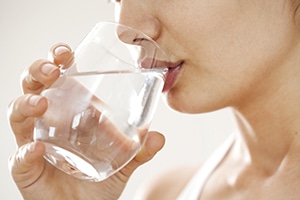
While the foods we eat affect the health of our teeth and gums, the same is true of the beverages we drink. Unfortunately, people sometimes overlook this fact when trying to find the cause of their oral health issues.
Because drinks have even more contact with teeth than food does, it’s important to look at the ingredients in the things you drink most often. Many soft drinks, for example, have high sugar and acid content that can cause issues such as tooth decay, a weakening of tooth enamel, and sensitivity. If you’re looking for ways to improve your oral health by what you drink, we offer some suggestions for healthy beverages as well as what to limit or avoid.
You Can’t Go Wrong with Milk, Water, or Tea
Milk has a reputation of being great for bone strength, but it also has the same effect on teeth. The Vitamin D and calcium in milk are especially good for teeth because they help to form a barrier that prevents tooth decay.
Water, whether it’s mineralized or straight from your tap, has important oral health benefits. Bottled water with added minerals contains calcium phosphate, an important element to help strengthen tooth enamel. Water from your faucet is full of fluoride that also strengthens teeth and does a good job at removing food particles.
Green or herbal tea is a good drink choice because both varieties contain antioxidant ingredients that help to prevent tooth staining. Instead of reaching for a glass of wine or soda known to stain your teeth, consider this healthy alternative instead.
Beverages That Can Damage Your Teeth
If you’re a soda lover, the fact that it’s bad for your teeth is one more reason to give it up. The high sugar content, which can be found in both regular and diet sodas, erode tooth enamel and cause tooth staining. When soda is your only option, be sure to drink a glass of water with the equal number of ounces as soon as you can.
Coffee, wine, and black tea are all dark drinks that contribute to teeth staining. If you feel you must have them, consider using a straw to keep as much of the liquid off your teeth as possible. Look for lighter colored alternatives of these beverages as well. Other drinks you may want to avoid include fruit juice for its high acid content and non-mineral bottled water since the bottling process strips it of fluoride. Choosing a fluoride supplement can help to make up for this if you have come to enjoy the flavor of pure bottled water.
Feel free to contact us at Mesilla Valley Family Dentistry if you would like more tips on choosing drinks that improve your oral health rather than potentially harm it.